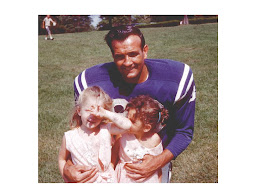Helicoptering: she introduced me to that phrase and I have since realized there are few that do it better! Karin holds a special place within neurosurgery-she was the first woman in the US to gain the position of Chair with an RRC approved residency training program at the University of Michigan.
http://www.med.umich.edu/opm/newspage/2004/neurosurgerychair.htmHer journey there has been anything but easy but at every step of her enormously successful journey she has literally and figuratively "risen above" and in doing so, gained the ultimate advantage of "helicoptering", the ability to see the whole picture, to better understand how the little pieces come together as a whole, and to avoid getting mired in the minutae of the moment.
http://www.icyou.com/topics/medical-fields/neurology/harder-brain-surgery+While her list of accomplishments are many, I would like to comment specifically on one. Karin has dedicated herself tirelessly to mentoring. She has taken enormous amounts of time to guide, nurture, and assist more women than any other neurosurgeon (she also mentors men regularly but for better or worse, men have a surfeit of mentors available). She has guided me through many difficult moments and I know she has done this for others. Somehow, she always has the time to help with a difficult clinical problem, put a job decision in perspective, see an answer to an organizational dilemna.
For more than 15 years she has also donated her time and resources to Project Shunt.
Detailed career highlights:
Graduated Yale, 1977
Graduated Columbia Medical School, 1981
President, Women in Neurosurgery (WINS), 1991
Associate Professor, 1996
Assistant Professor, University of Michigan Neurosurgery, 1990
Associate Professo, University fo Michigan Neurosurgery, 2004
Chair, Department of Neurosurgery (First woman in US), 2005
Society of NS, member 2005
Nina Starr Braunwald Award (AWS), 2005
ABNS, Director (First woman), 2008
Patients, patient families, women doctors, women surgeons, neurosurgery, the disadvantaged, the disabled-and more-all have benefitted from the dedication, compassion and expertise of this amazing First Lady of Neurosurgery!











